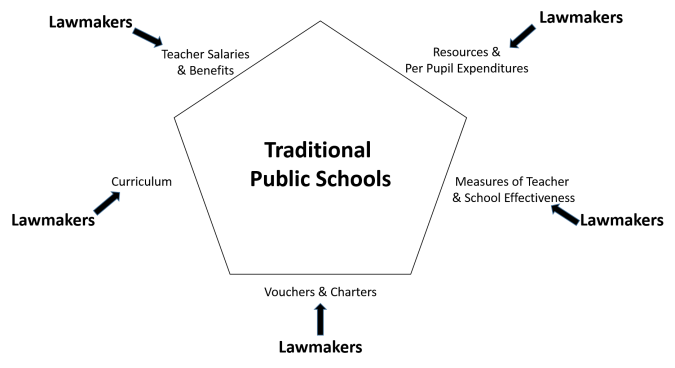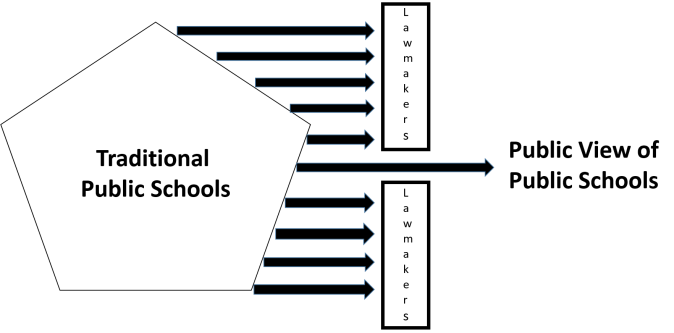Our public schools are better than many lawmakers portray them to be – lawmakers who have never spent time as educators.
A lot better. And the problem is not the schools. The problem is the lawmaking body that controls the narrative of how schools are performing.
With the constant dialogue that “we must improve schools” and the “need to implement reforms,” it is imperative that we as a taxpaying public seek to understand all of the variables in which schools are and can be measured, and not all of them are quantifiable.
And not all of them are reported or allowed to be seen.
Betsy DeVos’s March, 2018 assertion on 60 Minutes that America’s schools have seen no improvement despite the billions and billions of dollars thrown at them was a nearsighted, close minded, and rather uneducated assessment of public schools because she was displaying two particular characteristics of lawmakers and politicians who are bent on delivering a message that public schools are not actually working.
The first is the insistence that “they” know education better than those who actually work in education. Just look at the current US Secretary of Education and the outgoing State Superintendent of NC.
The second is the calculated spin of evidence and/or the squashing of actual truth. Those who control the dialogue in North Carolina and in many other states only tell their side of the spin and neglect to talk of all of the variables that schools are and should be measured by.
Consider the following picture/graph:

All of the external forces that affect the health of traditional public schools generally are controlled and governed by our North Carolina General Assembly, rather by the majority currently in power.
The salaries and benefits that teachers receive are mandated and controlled by the NCGA. When graduate degree pay bumps and due-process rights were removed from newer teachers, that affected recruitment of teachers. When the salary schedule became more “bottom-heavy” for newer teachers, it affected the retaining of veteran teachers.
With the changes from NCLB to RttT, from standard Course of Study to Common Core, from one standardized test to another, and from one curriculum revision to another, the door of public school “requirements” has become an ever-revolving door. Add to that the fact that teachers within the public schools rarely get to either help create or grade those very standardized tests.
North Carolina still spends less on per-pupil expenditures than it did since before the Great Recession when adjusted for inflation. Who has control of that? The North Carolina General Assembly.
Within the next ten years, NC will spend almost a billion dollars financing the Opportunity Grants, a voucher program, when there exists no empirical data showing that they actually improve student outcomes. Removing the charter school cap also has allowed more taxpayer money to go to entities that do not show any more improvement over traditional schools on average. When taxpayer money goes to vouchers and charter schools, it becomes money that is not used for the almost 85% of students who still go to traditional public schools.
And just look at the ways that schools are measured. School Performance Grades really have done nothing but show the effects of poverty. School report cards carry data that is compiled and aggregated by secret algorithms, and teacher evaluation procedures have morphed more times than a strain of the flu.
When the very forces that can so drastically affect traditional public schools are coupled with reporting protocols controlled by the same lawmaking body, how the public ends up viewing the effectiveness of traditional public schools can equally be spun.

If test scores truly dictated the effectiveness of schools, then everyone in Raleigh in a position to affect policy should take the tests and see how they fare. If continuing to siphon taxpayer money into reforms that have not shown any empirical data of student improvement is still done, then those who push those reforms should be evaluated.
So much goes into what makes a public school effective, and yes, there are some glaring shortcomings in our schools, but when the very people who control the environment in which schools can operate make much noise about how our schools are failing us, then they might need to look in the mirror to identify the problem.
Because in so many ways our schools are really succeeding despite those who want to reform them.
